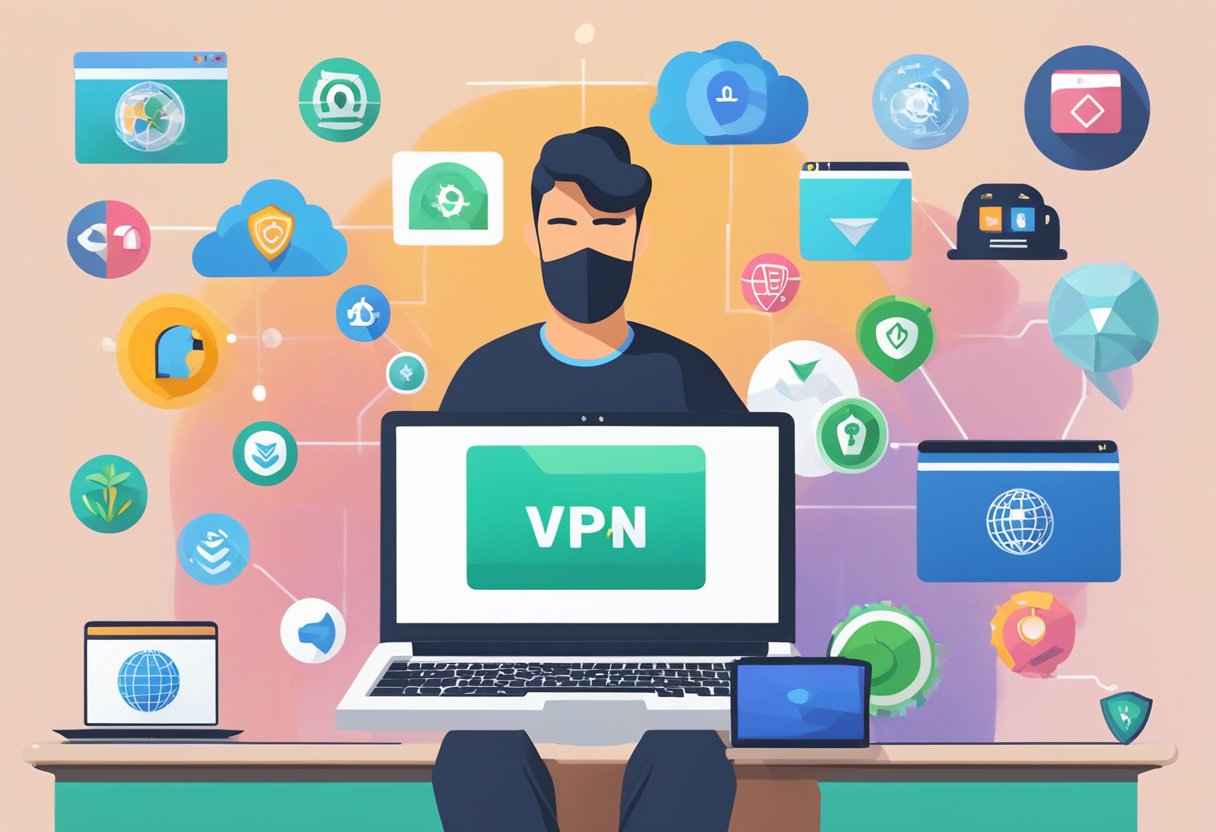Best VPN Services for Privacy: Ensuring Your Online Security and Anonymity
Choosing the right VPN service is crucial for protecting online privacy. The best VPN services offer strong privacy features, ensuring that personal data stays safe from hackers and unwanted tracking. With many options available, it is important to identify which services stand out due to their security capabilities and user-friendly features.

Some VPNs provide innovative tools and rely on advanced technology to keep users anonymous. By comparing various providers and their offerings, readers can make informed decisions that enhance their online security. This blog post will explore top VPN services and highlight their key attributes that make them suitable for privacy-conscious users.
As online threats continue to evolve, understanding the strengths of different VPN services is essential for anyone seeking privacy. This guide will lead readers through important considerations when selecting a VPN, ensuring they find the best fit for their needs.
Key Takeaways
- Top VPNs prioritize strong privacy and security features.
- Comparing services helps users find the right VPN for their needs.
- Understanding VPN features is key to enhancing online privacy.
Understanding VPNs
VPNs, or Virtual Private Networks, are essential tools for enhancing online privacy. They work by encrypting internet traffic and masking a user’s IP address, creating a secure connection to the internet. This section explores how VPNs protect privacy, the common protocols they use, and the importance of no-logs policies.
How VPNs Safeguard Privacy
VPNs safeguard privacy by encrypting data transmitted between a user’s device and the internet. This encryption protects sensitive information from hackers and third-party trackers. When a user connects to a VPN, their real IP address is hidden and replaced with the VPN server’s IP address.
This prevents websites and services from tracking personal browsing habits. As a result, users can navigate the internet more securely. VPNs also help bypass geographic restrictions, allowing access to content not available in certain regions.
Common VPN Protocols Explained
Different VPN protocols impact speed, security, and reliability. Some of the most common protocols include:
- OpenVPN: An open-source protocol renowned for its strong security and versatility. It works on multiple platforms and is widely used for its balance of speed and safety.
- WireGuard: A newer protocol that aims to be faster and simpler than others. It offers high performance and uses modern cryptographic techniques.
Choosing the right protocol is crucial for optimal privacy. Each protocol has its strengths, so users should consider their needs when selecting a VPN service.
The Importance of No-Logs Policies
A no-logs policy is a crucial feature in VPN services. It means that the provider does not keep logs of a user’s online activities. This policy helps ensure that even if a data request is made by a government or other entity, there is no data to disclose.
Users should look for VPNs that clearly state their no-logs policy to enhance privacy. Providers that undergo independent audits are often more trustworthy. A solid no-logs policy is crucial for anyone serious about maintaining their online privacy and freedom.
Identifying Top VPN Features
When choosing a VPN for privacy, it’s crucial to look at specific features that enhance security, maintain good performance, and offer user-friendly experiences. Below are key elements to consider.
Security Features Essential for Protection
Security is the top priority for any VPN service. One important feature is the Kill Switch. This tool disconnects the user’s internet if the VPN fails, ensuring no data is exposed.
Another vital element is Split Tunneling, which allows users to choose which apps or websites go through the VPN while others use the regular internet connection. This can optimize speed for non-sensitive activities.
Multi-Hop setups further enhance security by routing data through multiple servers, making it harder for anyone to trace online activity. Additionally, Obfuscation helps hide the fact that users are using a VPN, circumventing restrictions in certain regions.
Speed and Stability Factors
Performance is just as important as security. VPNs with high-speed servers make for a smoother online experience. Key metrics to check include download and upload speeds.
Simultaneous Connections matter too. Users need to know how many devices can connect to the VPN at once without slowing down performance. Services that support more connections allow families or teams to share a single account comfortably.
Stable connections help prevent interruptions. A VPN that frequently disconnects can expose data. Therefore, users should seek services with a strong reputation for reliability.
Ease of Use Across Platforms
User experience should not be overlooked. VPNs need intuitive interfaces that simplify navigation. Users benefit from clear, straightforward designs that make setting up and managing the VPN hassle-free.
Compatibility across devices is also key. Good VPN services support various platforms, such as Windows, macOS, iOS, and Android.
Easy installation processes and quick setup wizards enhance the overall usability. Good customer support can also make a significant difference for novice users who might need assistance.
Comparing VPN Service Providers
When looking for reliable VPN services, users need to assess important aspects such as pricing, privacy features, and customer support. Identifying the right VPN can enhance privacy and security while browsing online.
Premium VPN Services for Enhanced Privacy
Premium VPN providers often offer advanced features aimed at maximizing user privacy. Notable options include ExpressVPN, NordVPN, and Surfshark. These services provide strong encryption methods, a no-logs policy, and features like kill switches to protect user data.
- ExpressVPN: Known for its speed and reliability, plus it has a proven track record with independent audits.
- NordVPN: Offers advanced security features like double VPN and Onion over VPN.
- Surfshark: Provides unlimited simultaneous connections, making it cost-effective for families.
These premium services usually include customer support through live chat or email, ensuring users receive assistance quickly. Additionally, many offer transparency reports detailing how they handle user data.
Free VPNs: Pros and Cons
Free VPNs may seem appealing, but they come with several drawbacks. While they can provide basic privacy, many of these services lack strong security features. Users should be cautious about the privacy policy of free VPNs. Some may log user data or show ads.
Pros:
- No cost for basic functionality.
- Good for casual users who occasionally need anonymity.
Cons:
- Limited features compared to premium services.
- Slower speeds and potential data leaks.
- Risk of data mining or ads.
Users should research any free VPN to evaluate its trustworthiness, including checking if it has undergone third-party audits. Using reputable free options like ProtonVPN or Windscribe is advisable, as they have more favorable privacy stances.
Criteria for Assessing VPN Trustworthiness
To select a trustworthy VPN, users should consider several key criteria. This includes reviewing the VPN provider’s privacy policy and checking for any previous data breaches.
Important factors to evaluate:
- Transparency Reports: Reliable providers frequently release reports showing how they manage user data.
- Third-Party Audits: Independent audits provide insights into the security practices of a VPN.
- Customer Support: Good support channels can assist users with any concerns or technical issues.
Furthermore, it is essential to read customer reviews and conduct VPN tests to gauge performance and reliability. Only by confirming these aspects can users feel confident in their choice of VPN.
Specialized VPN Uses

VPNs offer various specialized functions that can enhance online experiences while maintaining privacy. These functions cater to specific needs such as streaming, torrenting, and securing connections on public Wi-Fi.
VPNs for Secure Streaming
Using a VPN for streaming allows individuals to access content that may not be available in their region. Services like Netflix often restrict content based on location.
A reliable VPN can help users bypass these restrictions. Users should look for VPNs known for high-speed connections and strong server networks.
- Key Features to Seek:
- Fast Speeds: Essential for smooth streaming without buffering.
- Server Locations: Plenty of servers in various countries to access global content.
- Bypassing Restrictions: Capability to unblocking popular streaming platforms.
Safely Torrenting with a VPN
When torrenting, privacy is crucial to avoid legal issues and protect personal information. A good VPN hides the user’s IP address, making their downloads anonymous.
This prevents copyright holders from tracking activities. In choosing a VPN for torrenting, important factors include:
- No Logs Policy: Ensures that user data is not stored.
- Speed and Bandwidth: To handle large files quickly.
- P2P Compatibility: Some VPNs are more suited for peer-to-peer sharing.
Using a VPN makes torrenting safer and helps keep personal data private.
Enhancing Privacy with VPN on Public Wi-Fi
Public Wi-Fi networks are often not secure, making users vulnerable to hacking and data theft. A VPN encrypts the internet connection, protecting sensitive information such as passwords and credit card numbers.
Using a VPN in such environments is crucial.
- Benefits Include:
- Encryption: Protects data from prying eyes.
- IP Address Masking: Hides the user’s true location.
- Secure Connections: Reduces risks when connecting to unsecured networks.
Opting for a VPN can significantly enhance online safety when utilizing public Wi-Fi.
Selecting the Best VPN

Choosing the right VPN requires careful consideration of specific features that enhance privacy and performance. Key factors include speed, security measures, and compatibility across multiple devices.
Top Picks for the Fastest VPNs
When speed is a priority, several VPNs stand out. NordVPN uses the NordLynx protocol, offering impressive speeds that can exceed 700 Mbps. This makes it excellent for streaming and gaming. ExpressVPN is another top choice, known for its robust server network and reliable performance. It is ideal for users who value speed and efficiency. Surfshark also provides competitive speeds, especially for those needing to connect multiple devices simultaneously, as it allows unlimited connections.
Exceptional Security with Strong Encryption VPNs
For users focused on security, ExpressVPN ranks as one of the most private options available. It implements strong encryption protocols to safeguard user data. Proton VPN is also noteworthy as it is designed with user privacy at its core. It operates from Switzerland, benefiting from strong privacy laws. NordVPN offers additional security features, including a double VPN option that routes traffic through two servers. These features ensure an added layer of protection against potential threats.
Cross-Platform VPNs for Comprehensive Coverage
Compatibility across devices is vital for a seamless experience. ExpressVPN supports a wide range of platforms, including iOS, Android, Windows, Mac, and Linux. This versatility allows users to protect their data on any device. Surfshark is similar in its support for multiple platforms, making it easy to secure smartphones, tablets, and computers. NordVPN also offers comprehensive support, ensuring users can enjoy its benefits whether at home or on the go. Each of these VPNs caters to a broad audience, promoting privacy without sacrificing performance.
Advanced VPN Features and Innovations

Modern VPN services offer advanced features that enhance privacy and protection online. These innovations include multi-hop connections, integrations with antivirus software, and new technologies aimed at improving user security.
Beyond Basic VPN: Multi-Hop and TOR
Multi-hop connections add an extra layer of security by routing data through multiple servers before reaching the final destination. This process creates a “Double VPN,” which makes it much harder for anyone to trace the user’s online activity.
Another significant feature is the ability to connect through the Tor Network. This routing method further anonymizes users by directing their traffic through multiple nodes. It’s especially useful for those who seek maximum privacy. Combined with regular VPN use, these features help to obscure users’ IP addresses and activity even more effectively.
VPN Integrations: Antivirus and Web Protection
Many VPN providers now include built-in antivirus and web protection tools within their services. This integration offers users a more comprehensive security package without needing multiple subscriptions.
Antivirus software works by scanning for malware and threats in real-time. Users receive alerts and can take action before these threats compromise their devices. Additionally, features like anti-tracking help protect against online trackers, ensuring that users maintain their privacy while browsing.
Some providers even offer meshnet technology, which allows users to connect securely with each other without relying on third-party servers.
The Future of VPN Technology
As privacy concerns grow, VPN technology continues to evolve. Emerging trends include advancements in encryption methods and potential for cyber insurance offerings. These changes aim to further secure user data against breaches.
VPNs are also looking at new ways to enhance threat protection, employing artificial intelligence to detect and respond to potential risks. Innovations like these could transform how users protect their information and navigate the web. The future holds promise for even more robust features that cater to an increasingly privacy-conscious audience.
Price and Investment in VPNs

Understanding the costs associated with VPN services is crucial for making informed decisions. VPNs come in various pricing tiers, with options that can fit different budgets. Evaluating the worth of a VPN subscription also involves considering the benefits it brings to online privacy and security.
Understanding VPN Pricing Tiers
VPN services generally offer multiple pricing tiers, often categorized as monthly, yearly, and multi-year plans. Monthly plans can be convenient, but they typically cost more over time. For instance, many VPNs charge around $10 to $12 per month.
In contrast, annual plans can reduce the monthly cost significantly, often ranging from $5 to $8 per month. Some VPNs even offer promotions that lower costs to about $2 per month for longer commitments. Users should also watch for basic versus premium features that may impact pricing.
Considering the Value of a VPN Investment
Investing in a VPN can enhance online privacy and security, making it a valuable tool for many users. A quality VPN might reduce exposure to threats, prevent data tracking, and allow access to restricted content.
Additionally, some VPNs, like ExpressVPN, are well-regarded for their speed and reliability, enhancing user experience. Value is not just in the cost but also in the protection offered. Evaluating features such as encryption levels, server locations, and device compatibility can help determine the value of an investment.
Money-Back Guarantees and Trial Periods
Many reputable VPN services provide a 30-day money-back guarantee. This allows users to test the service without the risk of loss. If a service does not meet expectations or fails to deliver, users can cancel for a full refund.
Trial periods and money-back guarantees are critical for users who want to explore different options. They can assess features and performance without committing long-term. This practice encourages VPN providers to maintain high-quality services, knowing users can easily opt out if unsatisfied.
The VPN Ecosystem
The VPN ecosystem includes a combination of tools that enhance online security and privacy. Two important components are VPNs and password managers. Both play unique roles in protecting user data and maintaining privacy.
Password Managers and VPNs: A Synergy for Privacy
Password managers help users create and store strong passwords for different accounts. They reduce the risk of using weak or repeated passwords, which can lead to data breaches. When combined with a VPN, this system strengthens security.
A VPN encrypts internet data, making it harder for hackers to access sensitive information. Together, these tools protect against phishing sites that attempt to steal user details. Using strong passwords with a VPN means users can confidently manage their online presence.
How VPNs Fit with Other Security Practices
VPNs complement other security practices for better protection. For instance, they work alongside data breach scanners that alert users when their information may be compromised. When a breach occurs, individuals can quickly change passwords to secure their accounts.
Additionally, using VPNs promotes secure connections through HTTPS. This ensures that data exchanged online remains encrypted. Users can also minimize their digital fingerprint, making it harder for trackers to collect personal information. By integrating VPNs with these security measures, privacy and security become more effective together.
Summing Up: The Optimal VPN Choice

Choosing the right VPN for privacy depends on several key factors. Users should consider their specific needs, such as streaming access, device compatibility, and security features.
Top Recommendations for Privacy:
- Mullvad: Known for its strong privacy policies and transparent operations. It offers excellent features at a low cost.
- ExpressVPN: It ranks high for its speed and security, making it suitable for streaming services like Netflix.
- NordVPN: Offers a dedicated IP address option and additional features for enhanced security.
Key Features for Users:
- Privacy Protection: A reliable VPN should keep user data anonymous and secure from third-party access.
- Spoof Your Location: The ability to change IP addresses is crucial for accessing content from different regions.
- Compatibility: Ensure the VPN supports the devices in use, including Windows, Mac, and mobile platforms.
Special Use Cases:
- VPN for Netflix: Not all VPNs can bypass geo-restrictions. It’s essential to choose one known for consistent access to streaming services.
- Cloud Storage: VPNs can help protect data stored in the cloud by encrypting the connection, adding an extra layer of security.
Selecting the best VPN for privacy requires assessing these elements to find the most suitable option for individual or organizational needs.
Frequently Asked Questions

This section answers common questions about VPNs and privacy. It covers security, logging practices, protocols, and options for specific devices.
What is the most secure VPN for privacy?
NordVPN is often recognized as the most secure option due to its strong encryption and various features designed to protect user privacy. It has passed multiple independent audits, which confirm its commitment to keeping user data safe.
Which VPN is truly private and does not keep logs?
Several VPNs are known for not keeping logs, such as ExpressVPN and Proton VPN. These services explicitly state that they have a strict no-logs policy, meaning they do not store user activity or connection details.
What is the best VPN protocol for privacy?
OpenVPN is widely regarded as the best protocol for privacy. It offers a good balance of security and speed, making it suitable for safeguarding online activities.
Which are the top 10 VPN services known for maintaining user privacy?
The top 10 VPN services known for privacy include NordVPN, ExpressVPN, Proton VPN, Mullvad, Surfshark, Private Internet Access, CyberGhost, VyprVPN, TunnelBear, and IPVanish. These VPNs prioritize user privacy and have established reputations for solid performance.
Are there any VPN services that offer strong privacy for Android devices?
Several VPN services offer robust privacy for Android users, including NordVPN and ExpressVPN. These services provide dedicated apps that use strong encryption to protect user data while browsing.
Can free VPN services be trusted for privacy, and what are the risks?
Free VPN services often come with risks. Many do not have strong privacy policies and may track user data. It is essential to research any free VPN options carefully to avoid potential privacy breaches.




Post Comment